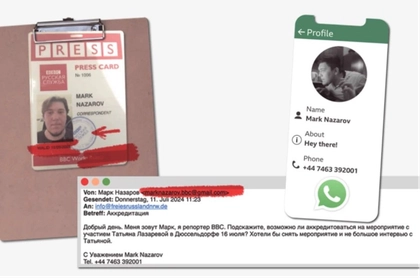The UK’s BBC discovered that a journalist from Moscow’s federal television propaganda channel Ren-TV was posing as a correspondent for the corporation’s Russian Service, to film interviews with Russian opposition members in Europe.
Airat Shiryaev who had previously worked for Russia’s NTV and Izvestia, now produces content for REN TV. Using the name Mark Nazarov, he used a British registered cell phone to set up WhatsApp and Telegram accounts, the email address marknazarov.bbc@gmail.com, and a fake BBC correspondent’s press card. Genuine BBC email addresses would use the corporation’s own server not “gmail.”
JOIN US ON TELEGRAM
Follow our coverage of the war on the @Kyivpost_official.
Using his fake BBC credentials Shiryaev / Nazarov tried to get accreditation for a meeting in Dusseldorf with Tatyana Lazareva, an exiled Russian television journalist who was labeled a “foreign agent” for her criticism of the war in Ukraine. Lazareva was in Dusseldorf working on a documentary film called “Where Am I?” in which she interviews Russian-speaking teenagers who emigrated to Germany after Russia's full-scale invasion of Ukraine.
One of the meeting organizers, Yuri Nikitin, leader of an anti-war organization among Russia’s exiled diaspora, suspected the ID was forged, probably because the word “valid” started with “w.”
Nikitin contacted the BBC to check whether Nazarov was genuine. A reverse search of Nazarov's Telegram profile photo led to a 2021 VKontakte page that revealed his true identity. Even though the BBC now knew he wasn’t who he said he was, they asked Nikitin to let the journalist attend so that its representatives could “meet” him at the event and warn Lazareva.

Trump’s Russia Plan – Will It Work? NATO, Putin & US Strategy Explained
As it turned out Shiryaev / Nazarov didn’t attend but hired two local journalists “Olga and Sergey,” who believed he was a BBC employee, to go in his place. The two stringers were armed with a list of questions provided by Nazarov for their interview with Lazareva in Dusseldorf.
The list included the following queries:
“In Russia, you were included in the list of terrorists and extremists. What do you think about this?”
“Russian propaganda says that you are happy about strikes by Ukrainian Armed Forces on Russia. If not taken out of context, did you actually say this?”
Nikitin told the BBC that it was not unusual to see “strange people with cameras” at opposition rallies who he assumed were linked to Russian propaganda outlets but said, “for people to want to be officially accredited and to send fake documents, is a first for us.”
At the BBC’s instigation, Olga called Nazarov using the WhatsApp phone number he had given her. She asked him who he really was, and he persisted with the fiction that he was a BBC reporter who had worked with Venediktov (another exiled opposition journalist) and said he had “left Russia after the start of the SVO.” She was prompted to ask who he was working for, but he didn’t know the name of the editor of the BBC Russian Service.
The BBC journalists themselves also called him later via video link, which confirmed that he was Shiryaev, but he maintained that he worked as a special correspondent for the BBC “Russian News Service” (which doesn’t exist) in a documentary about “foreign agents, who, let's say, don't like Russia very much.”
He then asked what was the problem and couldn't he get the video recording of the meeting with Lazareva?
Later, the BBC contacted Shiryaev, via Telegram on his Russian phone number, and asked why he had been using forged documents.
In response, he wrote: “Don't ask stupid questions, so you don't get stupid answers. I don't want to speak to comrades like you… come to Moscow, maybe I'll tell you how my photo ended up on a BBC press card. And now I suggest you disappear into the sunset and don't interfere with my work.”
Shiryaev signed off by accusing the BBC of peddling lies writing: "Go *****. And take the BBC with you along with Lazareva.”
You can also highlight the text and press Ctrl + Enter










